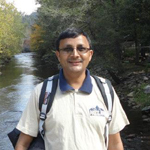Gopal Prasad Bashyal
I attended the 6th International Conference of Bangladesh English Language Teachers’ Association (BELTA), held in Dhaka, Bangladesh in January 2013. On this post, I am going to highlight the experience of attending the conference as one of the NELTA members.
Dhaka became unexpectedly warmer after a week’s unusual cold. The airhostess in Biman Bangladesh welcomed the passengers immediately after they stepped into its cozy comfortable cabin and made everyone laugh. She said, “Welcome to the cold winter in Bangladesh.” Thanks to the BELTA people who had already informed us individually and through their website www.belta-bd.org. The plane flew high. It flew higher and much higher. It could scale the sky over the cloud; it made its way breaking the cloud; and I was sensing the thrill of its ascent. It made me think about the height of my destination. The plane landed on ShajahInternationalAirport. For me it was a beginning since I had not scaled any professional height so far. For me it was a move in the runway. For me this was the first attempt to offer myself as a competent learner in the crowd of such a mega ELT event outside Nepal.
It was January 16. The sun was slowly hiding into the horizon. George Pickering, the trainer for Peer Support Review (PSR), chased us to the Conference Hall on the sixth floor of Royal Park Hotel, Banani, where we were introduced with the BELTA Chapter representatives. The PSR training was enthusiastically entertained as the milestone for the strong foundation and active functioning of Teacher Associations (TAs) like NELTA, BELTA and SLELTA. The PSR was mainly about BELTA and NELTA. We began a diagnosis of TAs’ leadership, management, their functioning and performance, documentation and future directions. The PSR members were divided into three groups and assigned tasks: Group A mission and strategy, leadership and communication, Group B the International Conference, newsletter and website, and Group C Marketing and membership, training and development, finance, and innovation and networking.
The reviewers were oriented about questioning skill, investigating information, conducting focus group discussion (FGD), and reporting. The reviewers interviewed and organized FGD with the participants, members, executive members and office bearers. They also studied the publications and records. The reviewers obtained the necessary information during the Conference. The participants and executives were happy to talk to the reviewers since it was a kind of learning process through mutual interaction.
BELTA has earned prestigious position as a volunteer institution working for enhancing ELT in Bangladesh. The presentations and representations in different forums at home and abroad by its leaders, regular events like trainings, workshops. Emerging Chapters, partners in Bangladesh and outside, professionally competent leadership and growing interest of teachers in BELTA and its activities are some evidences that BELTA lives forever. Though there are only 10 Chapters and only about 200 life members, the participation of more than 500 in its 6th International Conference was a great success and a sign of bright future.
The Conference was well managed regarding time, communication and range of presentations. The Conference featured 104 presentations – 6 plenary presentations by invited speakers, 27 workshops, 67 papers, one debate, two panel discussions, pecha kucha, cultural show, and book fair. The theme of the Conference was “Multiple Realities of English: ELT and Beyond.” During the conference, invited speaker George Pickering focused on the urgent necessity of teachers to change themselves due to the changing role of teachers, new teaching methodologies, educational reforms, new learning techniques and globalization. He observed growing Englishes in different regions.
Discussing on the ELT in South Asia, Adrian Tenant observed the lack of integration – while implementing one part of educational process the others are neglected. His workshop focused on teachers’ beliefs and reflective teaching. Likewise, Prof. Fauzia Shamim from Taibah UniversitySaudi Arabia, specified the knowledge, skills and dispositions necessary for effective teaching as benchmarks of the standards for teacher education. She shared about ‘teacher evaluation for development’ in her plenary and in her workshop focused on large class as an opportunity.
Dr Eric Dwyer from the US argued for incorporating local contributions in the curricula and also focused on developing classroom libraries of student generated compositions – using minimal resources. Another invited speaker Prof. Rubina Khan’s speech focused on teacher leadership. In addition to these plenary speeches, other presentations range from topics on young learners to adult education, from tertiary and secondary education to curriculum and materials design, from community-based learning to the use of technology, from examinations and its impact on society to the concept of developing innovative practices. They were research based and thought provoking.
The Conference was a gallery of highly professional scholars from Bangladesh, SAARC region, the US, the UK and Saudi Arabia. It was a galaxy of novice young and worldwide popular experienced teachers working at various contexts. The rooms were well-equipped and the volunteers were ready for maintaining necessary arrangements.
As an ELT practitioner, it’s a great opportunity to enjoy abroad journey for professional development. Women leadership, time management, range of presentations, professional as well as managerial leadership, coordination among partners and sponsors, growing competent human resource at local level are some major lessons on the part of association.
The Conference also gave a message for empowering the learners using locally available sources and engaging students for varieties of learning processes. Despite problems to implement communicative language teaching, teachers can identify and select the appropriate techniques applicable in their own context. The Conference gave the message that teachers need not run after the experts or ‘heavy weights’; they are innovators of appropriate techniques for their classroom. For this, teachers need to gain and update knowledge and skills of current techniques and technologies through continuous professional development and enjoy teaching.
—
 Gopal Prasad Bashyal
Gopal Prasad Bashyal
Chair, NELTA Palpa Branch,
Presenter and Reviewer,
Sixth BELTA International Conference, Dhaka, 2013
Email:gopalbashyal@gmail.com